My wise friend @logiczombie asked me if @joeyarnoldvn is descendant of
the monkey king?
I have been pondering his question for a long time.
The hypothesis that my handsome friend @joeyarnoldvn is a descendant of the great Monkey King was famous among the Chinese.
However, it was only a number of speculations and hypotheses, not orthodox.
@joeyarnoldvn is a generous and nice person, but if I make hasty guesses about his ancestors, he will be offended.
So, I decided to collect records and legends about the Monkey King from all over the world, including mainland China.
I have been asking questions by sending @joeyarnoldvn 's photos to universities in China and Taiwan.
Taiwanese scholars have argued that @joeyarnoldvn is a descendant of the white monkey. 😲

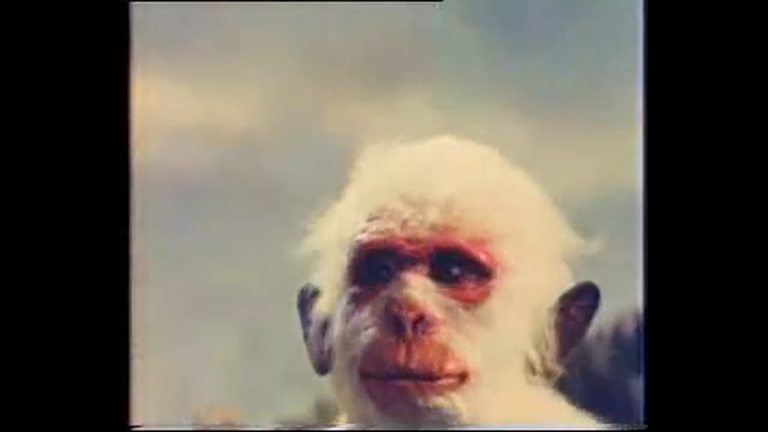
The University Research Institute in Taiwan sent shocking information and photos about @joeyarnoldvn's ancestors.
I was shocked to see the materials sent from Taiwan's most famous Lie Creation Lab.😲
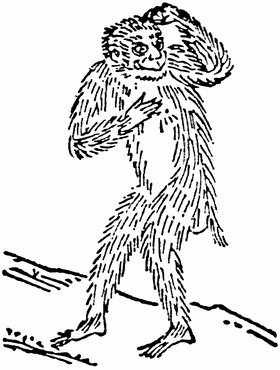 ▲ An example of a depiction from Japan. "Yamako" from the Wakan Sansai
▲ An example of a depiction from Japan. "Yamako" from the Wakan Sansai
Jué yuán (玃猿) (in Chinese "Jué yuán", in Japanese "Kakuen") is a legendary animal in the legends of China. They are also called Jué (玃) (in Japanese "kaku"), Jué fù (玃父), Jiā (猳), Jiā guó (猳國) (in Japanese "kakoku" カ国 ),[1][note 1] and mǎ huà (馬化) (in Japanese "baka"). They are similar to monkeys, and thus possess a characteristic of carrying away human females and violating them.[2
According to the medical herb book Bencao Gangmu (本草綱目), they are bigger than monkeys,[3] and according to the Baopuzi (抱朴子), a míhóu (獼猴, meaning rhesus monkey[4]) that lives for 800 years becomes a yuán (猨, ape), and if they live for 500 more years, then they become a jué,[2] it can live 1000 more years.
In the Bencao Gangmu, it is written as 玃 ("jué") and 玃父 ("jué fù").[5] A "jué" is a monkey that has grown old, and has a dark blue color. It walks like a human, and they often kidnap humans or objects. There are only males and no females, and therefore they would abduct human females who then give birth to children.[5]
According to In Search of the Supernatural (Sou Shen Ji, 搜神記) and a book titled Bo Wu Zhi (博物志), under the names 玃猿 (Jué yuán), 猳國 (Jiā guó), and 馬化 (mǎ huà), there is as follows. They live in the mountains in southwest Shu, and resemble monkeys, and with a height of about 7 shaku (about 1.6 meters), they walk like humans. They live in villages in the middle of mountains, and when humans pass by, they distinguish between males and females by their scent and abduct women, and as their own wives, make them bring birth to children. The women who are unable to bring birth to children are not allowed to go down from the mountain, and after 10 years, their appearance and mind becomes the same as those kakuen, and lose their will to return to the human village. The women who give birth to children are allowed to return to the human villages along with their children, but since those who don't raise their children all died after coming back down to the village, the women would be fearful of that and thus raise the child. Like this, the child that was born from a kakuen and a human woman would have an appearance similar to that of a human, and when raised, they are no different from an ordinary person at all. Originally, the child's family name should be from the father, but since the family name of the kakuen, who is the father, is unknown, they take on Yang (楊) as a provisional family name. In southwest Shu where there are many people with the family name Yang, it is said that they are all descendants of kakuen.[1][2] It has been pointed out that kakuen like these with these characteristics match with the cryptid called yeren.[2]
From the book Yijianzhi (夷堅志) from the Southern Song era, there is as follows. On the bank of a certain of a mountain stream, when it became night a man appeared, and when people wanted to cross the river, he would carry them on his back and take them across. Even when the person asked him for the reason, he gave an admirable reply that it was for no reason except for his desire to help. The bold and brave man named Huang Dunli (黄敦立) thought him suspicious, three days after being ferried across the river the same way, said that he would ferry that man across the river as gratitude. The man, who refused, was thus forcibly taken by the arms and taken across the river and a large rock was thrown at him. The man who let out a cry was illuminated by a torchlight, and his appearance turned into that of a kakuen. When the kakuen was killed and burned, it is said that the bad smell reached several li away.[2]
The legend of the white monkey was famous in China and Japan, but not because there are no monkeys in Korea.
Jué yuán (玃猿) (in Chinese "Jué yuán", in Japanese "Kakuen") was very clever, strong and magical. So, he lived to the age of 1000, kidnapping human women, marrying them, and leaving behind descendants.
Some scholars claim that the legend of the white monkey was transformed and created as a monkey king.
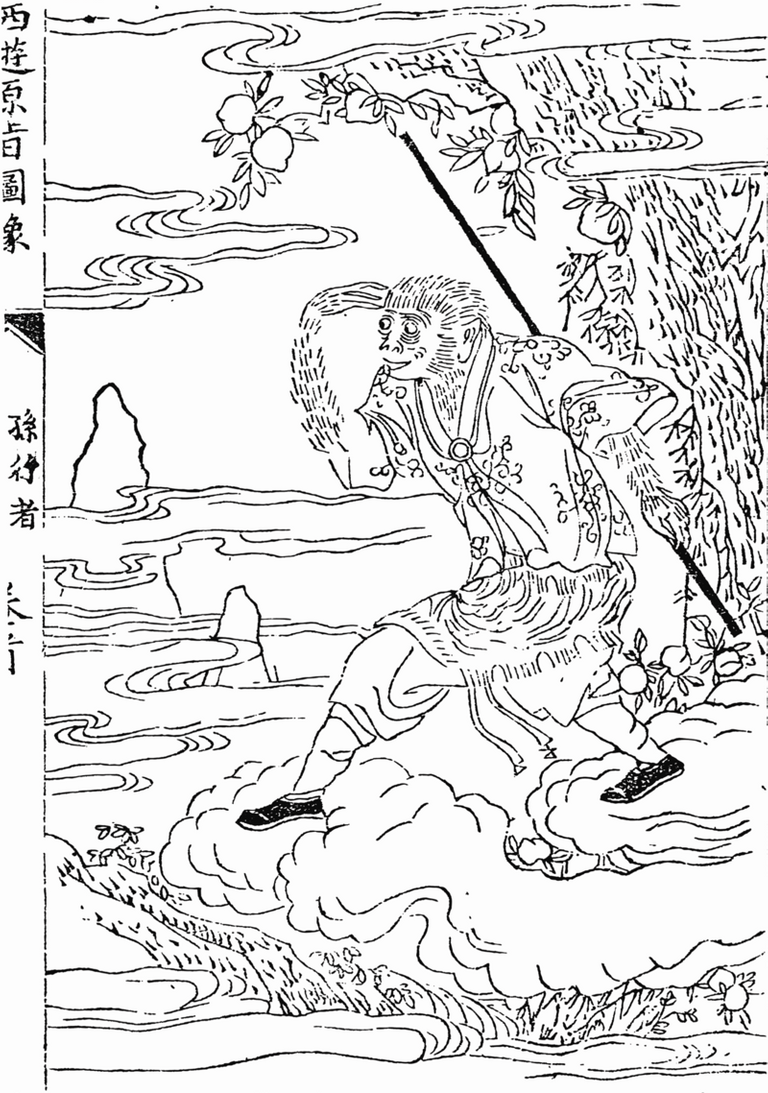 ▲ Sun Wukong
▲ Sun Wukong
The Monkey King, known as Sun Wukong (孫悟空/孙悟空) in Mandarin Chinese, is a legendary mythical figure best known as one of the main characters in the 16th-century Chinese novel Journey to the West (西遊記/西游记) and many later stories and adaptations.[2] In Journey to the West, the Sun Wukong is a monkey born from a stone who acquires supernatural powers through Taoist practices. After rebelling against heaven, he is imprisoned under a mountain by the Buddha. After five hundred years, he accompanies the monk Tang Sanzang (唐三藏) and two other disciples on a journey to retrieve Buddhist sutras from the West (the Indian subcontinent), where Buddha and his followers reside.
Sun Wukong possesses many abilities. He has immense strength, and is able to support the weight of two celestial mountains on his shoulders while running "with the speed of a meteor".[3] He is extremely fast, able to travel 108,000 li (54,000 km, 34,000 mi) in one somersault. Sun Wukong also acquires the 72 Earthly Transformations, which allow him to transform into various animals and objects. He is a skilled fighter, capable of defeating the best warriors of heaven. His hair possesses magical properties, capable of creating copies of himself or transforming into various weapons, animals, and other objects. He also demonstrates partial weather manipulation abilities and can stop people in place with fixing magic.[4]
As one of the most enduring Chinese literary characters, the Monkey King has a varied background and colorful cultural history. His inspiration comes from an amalgam of Indian and Chinese culture. The Monkey King was possibly influenced by the Hindu deity Hanuman, the Monkey-God, from the Ramayana,[5][6][7] via stories passed by Buddhists who traveled to China. The Monkey King's origin story includes the wind blowing on a stone, whereas Hanuman is the son of the God of Wind. Some scholars believe the character originated from the first disciple of Xuanzang, Shi Banto.[8]
His inspiration might have also come from the White Monkey legends from the Chinese Chu kingdom (700–223 BC), which revered gibbons.[5] These legends gave rise to stories and art motifs during the Han dynasty, eventually contributing to the Monkey King figure.
I think The Monkey King is a fantasy of the kings of China's neighbors, who have been fighting for a long time with the Chinese emperors.
I think The Monkey King is a symbol of freedom, independence and revolution.
However, Chinese emperors have despised The Monkey King as a barbarian.
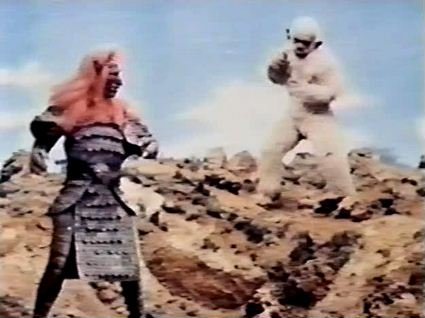
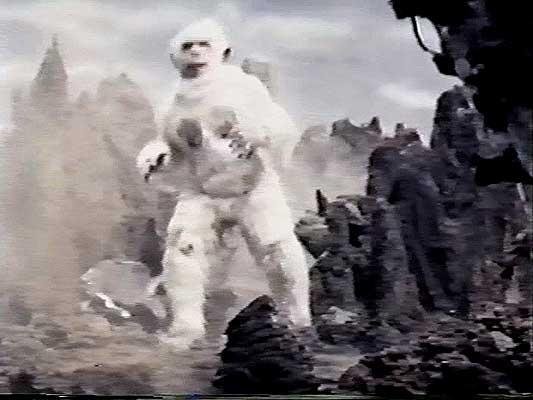
The white monkey was also a symbol of a hero, sanctified in China and neighboring countries.
So, the Taiwanese created a movie about the white monkey fighting demons for humanity.
The white monkey, presumed to be the immediate ancestor of @joeyarnoldvn, has been revered as a fun, divine hero, familiar to East Asians, including China, since ancient times.😜
So, I will pass pictures of my friend @joeyarnoldvn to as many East Asians as possible.
I intend to collect more materials and information about @joeyarnoldvn's ancestors, which East Asians consider sacred. 😆
By the way, my wise friend @logiczombie asked me to write a movie screenplay, but it is difficult because my English level is still insufficient. I hope @logiczombie understands that I use English at elementary school level in the United States. 😅
Thanks to my wise friend @logiczombie's encouragement and voteing, I will continue to research and present the secrets of @joeyarnoldvn. 😄
There is no DNA studies that proves he is not.
∴